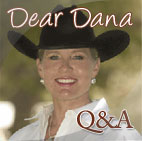EHV-1 cases at Desert Circuit forces cancelation of Feb. 19-20 Western show
SAN JUAN CAPISTRANO — With three confirmed cases of non-neurologic EHV-1 over the weekend at the Desert Circuit hunter-jumper series in Thermal, the Rancho Mission Viejo Riding Park has cancelled the Feb. 19-20 SoCal Ranch & Slide event.
The show is the first of four 2022 ranch riding and reining competitions scheduled at the Orange County venue, and it marked the first western events ever scheduled at the venerable facility known for hosting world-class hunter-jumper competition.
“Out of an abundance of caution due to the EHV-1 equine virus and for the safety of the horses, the Rancho Mission Viejo Riding Park has canceled the Feb. 19-20 western show,” announced management of the SoCal Ranch & Slide Series, Orange County-based Track One Events.
Track One Events added that the second western show in the SoCal Ranch & Slide Series, set for March 5-6 at the Rancho Mission Viejo Riding Park, remains on schedule.
Additional info on the show series: https://www.trackoneevents.com
Additional coverage of the EHV outbreak at the Desert Circuit: https://bit.ly/ehvdesertcircuit
Corona Coping!
Readers share how horses make a difference…
The horses are the ONLY thing in my life that has seen relatively no change since the virus. I get up, shovel poop
, brush the horses, tend to my human family and then I saddle up and ride. From the second that I get on, the rhythm of riding relaxes my whole self. The trail is in front of me, the horses quietly flick their ears and plod along — and for a while, there is no virus. Just us.
I’ll ride ’til they close trails, and then I’ll just take walks on the street with them. I hope everybody out there is just breathing in their horses and staying well.
– Juliet Johnson, Los Angeles
Corona Coping!
Readers share how horses make a difference…
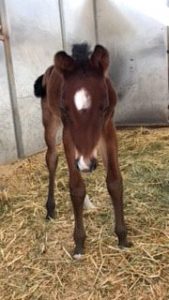 “As a horse owner and a pediatric nurse, there has been a lot of uncertainty, but in the midst of all of it our mare delivered during a rain storm Thursday morning — a healthy colt! It makes you realize life is such a gift and a blessing.”
“As a horse owner and a pediatric nurse, there has been a lot of uncertainty, but in the midst of all of it our mare delivered during a rain storm Thursday morning — a healthy colt! It makes you realize life is such a gift and a blessing.”
— Regina Faucette
Let’s ride this out!
Horse tips during COVID-19 concerns

The outside of a horse is good for the inside of a horseperson.
So, how do we spend the period (weeks?, months?) between now and the end of the COVID-19 viral scare?
From top to bottom, the COVID-19 crisis has affected all aspects of our local horse communities. Someday — hopefully later this spring — the gauntlet of rules and quarantines will pass, allowing us to return to our untethered equestrian lives. Those who are fortunate enough to be healthy but who may have a hiatus from work, school or other obligations because of lay-offs and closures — your horse is there.
California is a big state with a variety of restrictions, so please check with local government constraints during the quarantine. For example, seven counties in Northern California have “shelter in place” orders from the State. Other counties have no reports of confirmed cases.
Having said that, here are some tips for equestrians:
Gatherings
Bans on all gatherings of more than 10 people remain in effect. This means that any event larger than 10 people (e.g. horse shows, clinics, larger trail rides, conferences, etc.) are against federal recommendations, and in some areas, local laws.
Equine Related Injuries – ERs and Hospitals
During this time, exercise extreme caution in your own equine activities. Think twice about doing anything that might increase your risk of injury. The state continues to face shortages in the medical community, including reduced inpatient beds, availability of doctors, and sterile medical environments free of possible COVID-19 contamination. Trips to the ER increase your risk of contracting disease, and you may also be taking up medical resources that are needed by very sick people.
Social Distancing for Stables – Best Practices
The CDC and WHO also suggest the practice of social distancing. This should apply to all activities including equestrian activities at your farms, barns, and other agricultural buildings. Please ensure:
- A minimum space barrier of 6 feet between yourself and other people at all times. (e.g. no giving leg ups, no riding side by side, etc.)
- No more than 10 people in an area or present at an activity at one time.
- Sanitization of all common surfaces, supplies, and other items.
IMPORTANT NOTE: A person CAN contract COVID-19 by touching a surface or object that has the virus on it. The virus can survive from several hours up to a week on surfaces, depending on the type of surface, and the temperature and humidity. https://www.prevention.com/health/a31405079/how-long-does-coronavirus-live-on-surfaces/
These objects found in and around your farms include but are not limited to:
- Tack and Apparel: Bridles, Saddles, Girths, Saddle Pads, Wraps, Helmets, Boots, and all other Leather and Cloth items.
- Communal Barn Supplies: Pitch forks, Wheelbarrows, Hoses, Grooming equipment, etc.
- Rest room, tack room, feed room door knobs, light switches, etc.
We strongly advise you consider this when making decisions to continue your lesson programs and invite individuals including boarders to your facilities. You can find a list of disinfectant products that are effective in killing the COVID-19 virus here: https://www.epa.gov/pesticide-registration/list-n-disinfectants-use-against-sars-cov-2
Business Insurance – Loss of Income Clauses
If you own a business and are or expect to suffer a significant loss of revenue, we encourage you to check your business insurance policy for loss of income clauses and any recourse during a declared national or state of emergency.
Horse Care & Welfare – Available Resources
Finally, all members of California’s wide equestrian community should be thinking about how we can be prepared to help our fellow equestrians and their horses as the economic impact of the pandemic widens and is felt locally. If owners can no longer afford to care for their horses, contact association leadership and horse rescue operators for suggestions and options — before horses become abandoned or go without hay or feed.
If you have helpful information or news to share, please send to news@horsetrader.com so we can post it on our online newspage and also on our Facebook and Instagram pages.
Facing Fire
Hoping wildfires will leave us alone isn’t enough; preparedness is our best bet to protect our horses
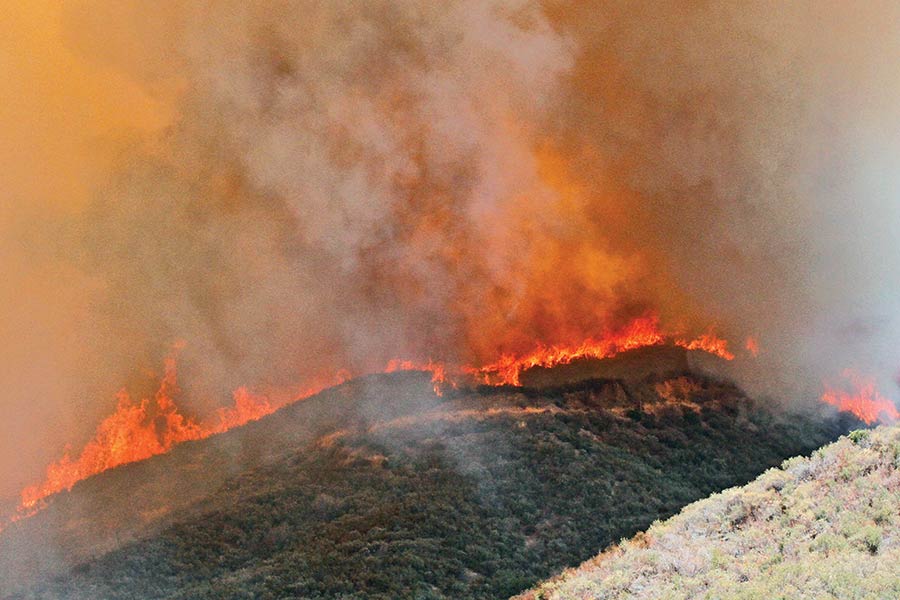
What does it mean to prepare for a disaster? Preparedness is important for all animals, but it takes extra consideration for horses because of their size and the requirements for transporting them. If you think that disasters happen only if you live in a floodplain, near an earthquake fault line, or in a coastal area, you may be tragically mistaken. Disasters can happen anywhere and include barn fires, hazardous materials spills, propane line explosions, and train derailments, all of which may necessitate evacuation. It is imperative that you are prepared to move your horses to a safe area.
Hauling Horses: Still confused?
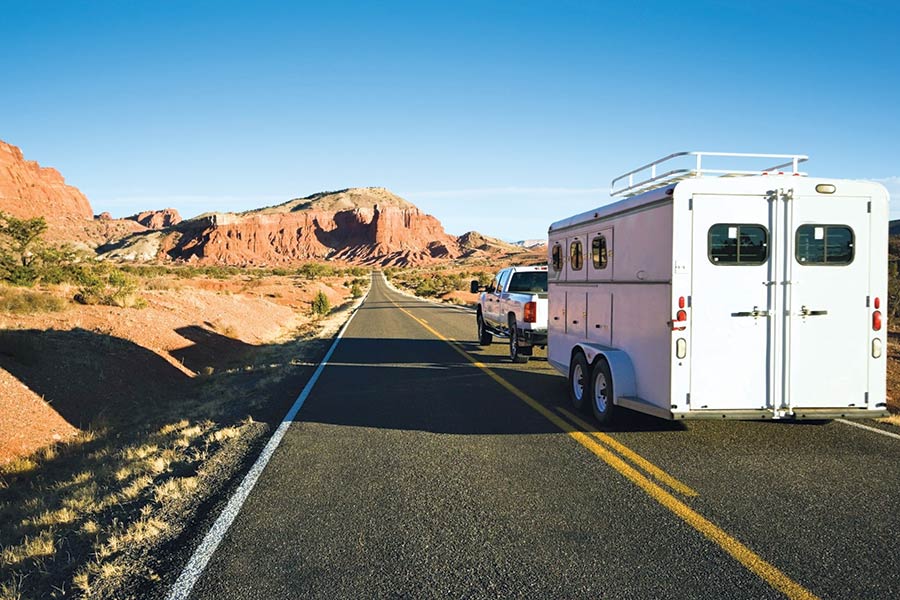
The federal government enacted rules almost two years ago that continues to cause confusion across the livestock industry, including how it affects the transportation of horses. Last year, the American Horse Council worked with the Federal Motor Carrier Safety Administration to clarify concerns.
Bottom line: In general, these rules do not apply to the occasional, short-haul transportation of horses, provided it is not for compensation or commercial purposes.
The result of the AHC-FMCSA meetings were these two pamphlets:
300 miles… with a mission!
Back Country riders made it from Norco to Bishop!
Follow their journey…
After months of planning—and training—Mike Williams and Rebekah Wan completed a 320-plus mile trek from Norco to Bishop. A foursome of Mike, Rebekah, Linda Wesch and Carol Kelly left SoCal Equine Hospital on Sixth Street at 8:02 a.m., Friday, May 3, and Mike and Rebekah reached Bishop Wednesday, May 22.
Day 20: Made it!…we arrived in Bishop!
Wednesday, May 22
20.2 miles / 5 hours, 21 minutes / 482 ft. / 3.8 mph
We made it! 320-plus miles in 19 days through mountain ranges, desert, flood plains, aqueducts, streams, train tracks, trestles, wind, rain, heat … and patience. All the horses are showing the wear-and-tear, as are the riders, but they all made it! Mike and Rebekah are ready for some good R&R — no more midnight waterings, 4 a.m. feedings, 7-8 a.m. starts in the saddle, and riding from dawn to dusk. The horses are ready to relax, heal up from some minor scrapes and soreness. After 320-plus miles, Mike has lost weight, Rebekah is already talking about another ride, and the horses all look healthy. They have kept their weight and look stoic, and the spouses are ready for their loved ones to be home.
Upon their arrival in Bishop, Mike and Rebekah were greeted by Backcountry Horsemen of California members Alan Sanderson, the Moslers, and Terry Jorgenson. What a day! Here’s the final leg of the journey: http://bit.ly/190522-Day20
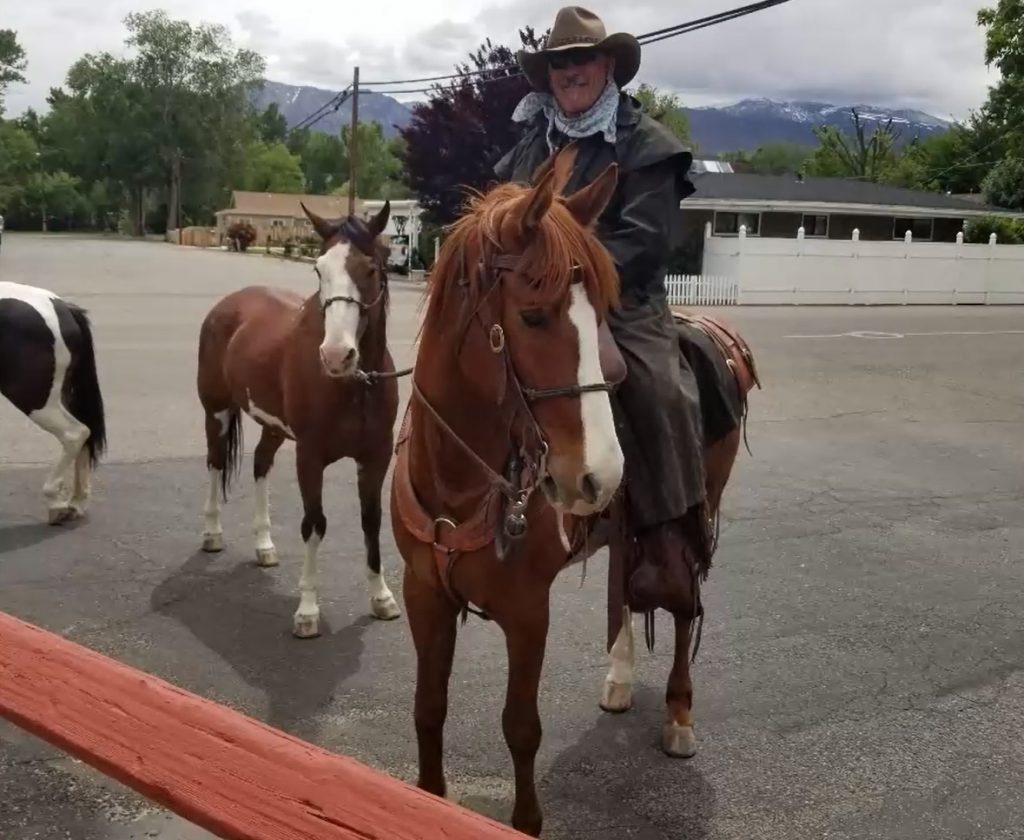
Day 19: It’s the homestretch
Tuesday, May 21
14.5 miles / 3 hours, 55 minutes / 446 ft. / 3.7 mph
We trailered out to Taboose to pick up the trail Mike and Rebekah left yesterday. All four horses are with them. http://bit.ly/190521-Day19
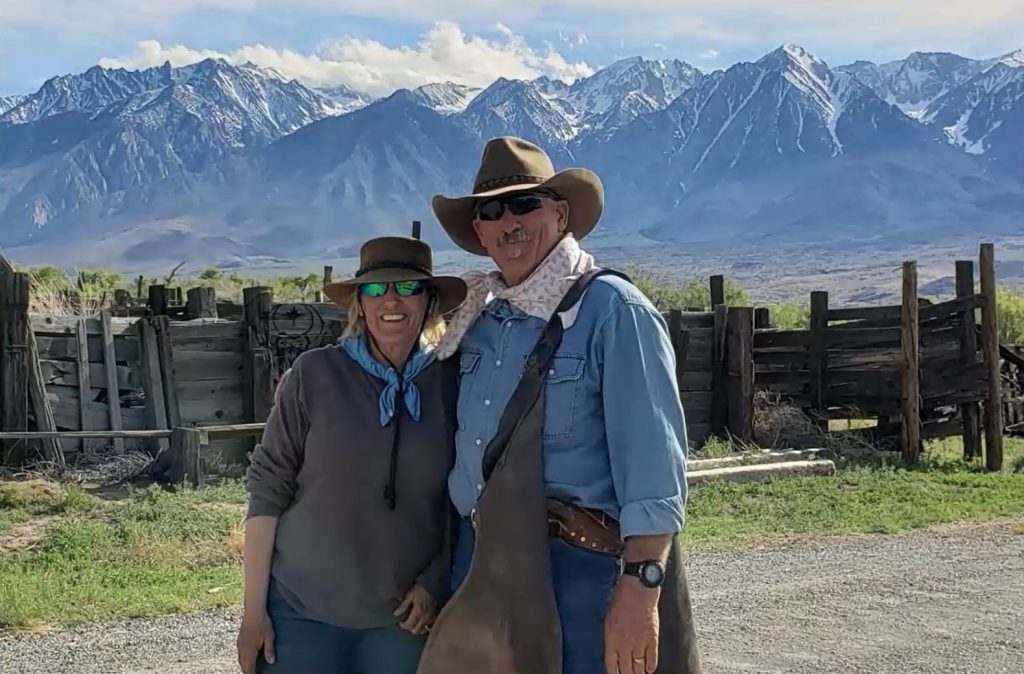
Day 18: Going in circles!
Monday, May 20
21.8 miles / 5 hours, 57 minutes / 312 feet / 3.7 mph
Today’s ride took Mike and Rebekah to Taboose where they were picked up and taken back to Independence to spend one more night. Only took two of the four horses today and left two in camp to have a break from yesterday. Land-locked on several occasions, we had to go in what seemed like circles! You can follow the crazy route here: http://bit.ly/190520-Day18
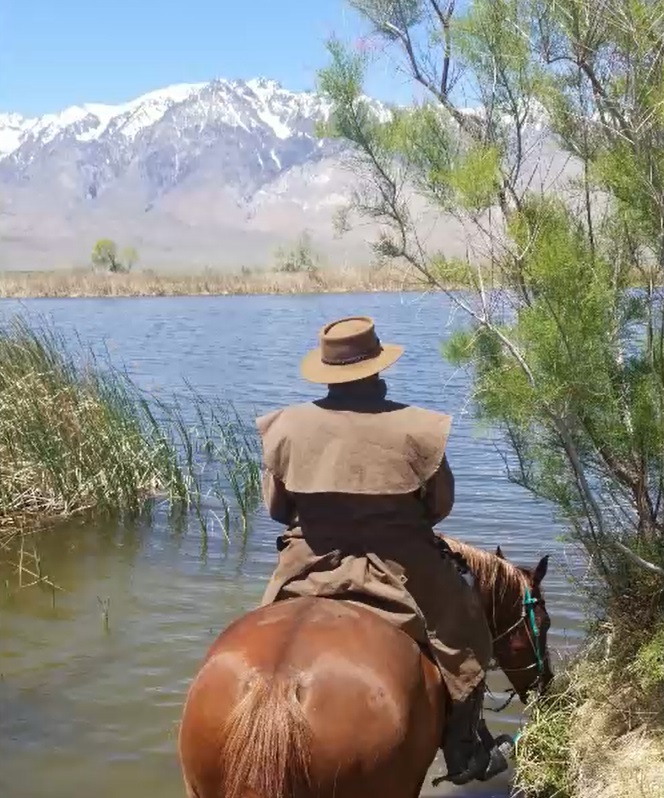
Day 17: An extremely HARD ride
Sunday, May 19
26.9 miles / 8 hours, 18 minutes / 1,234 ft. / 3.2 mph
Today’s ride was extremely hard. Between the wind, locked gates, inaccessibility because of floods and washouts, and again wind, it became a hard day for horses, riders, and our ground crew. We had over 50-mph gusts and were told that some gusts exceeded 70 mph. We were all exhausted when we arrived in Lone Pine. The longest day yet. Tomorrow will bring us a shorter day — 17 miles and three days away from our final destination. Follow our challenging day here: http://bit.ly/190519-Day17
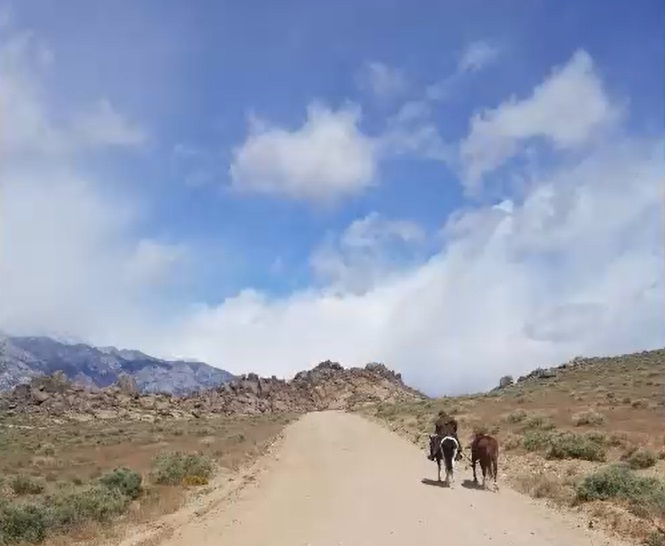
Days 15-16: Let’s give horses a break
Friday, May 17
Time for a layover and let the horses have a break, get laundry done and have some down time. Sigrid came up and made our meals and then we all enjoyed a movie (The Man From Snowy River) and popcorn along with some liquid refreshments.
Saturday, May 18
Another layover day to relax. Another movie (“Return to Snowy River”). Sigrid made tri-tip today with baked potatoes and beans. No one can say we didn’t eat right on this trip. Some shopping done earlier this morning to buy the rest of the food supplies for our last week.
Day 14: Slight change of route today
Thursday, May 16
26.3 miles / 7 hours, 57 minutes / 1,644 ft. / 3.3 mph
Last night was a cold windy night. Rain in the forecast and 50 mph gusts. Mike and Rebekah have decided not to trailblaze today and use the DWP access road to take them into Lone Pine. Follow the day here: http://bit.ly/190516-Day14
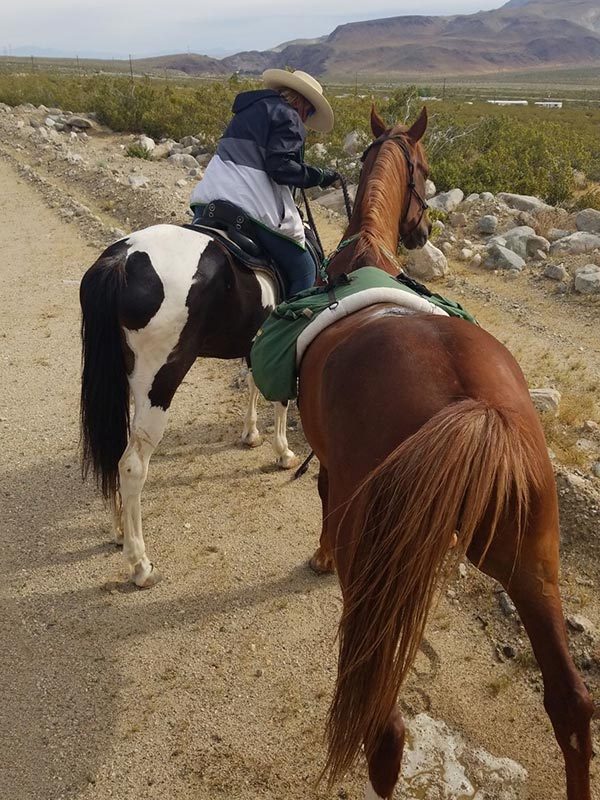
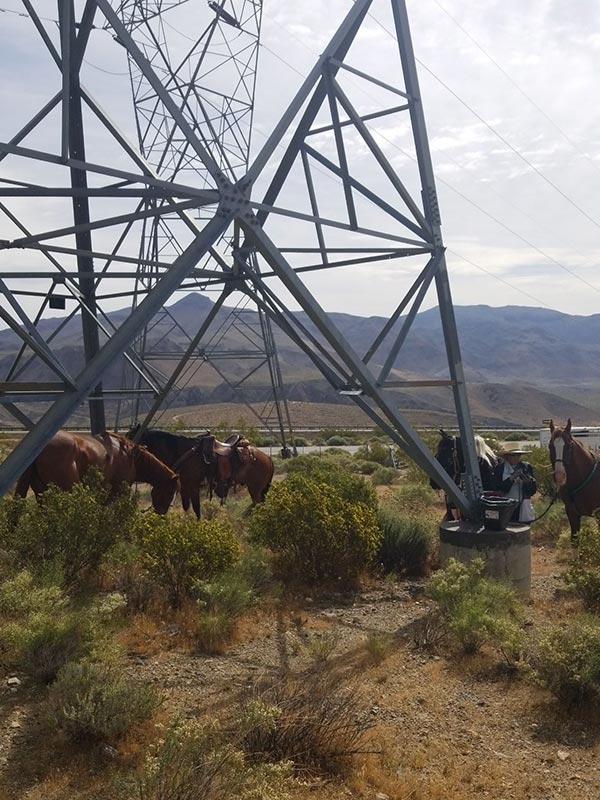
Day 13: Steak & Eggs
Wednesday, May 15
21.4 miles / 6 hours, 22 minutes / 801 ft. / 3.4 mph
Riding to Olancha tonight. Breakfast this morning consisted of steak and eggs. Only the best for our loved ones. Mike, Rebekah and the horses had to go through a boulder field and had to rock hop for several miles. Horses were quite tired after their day. They rode a little over 21 miles.
Relive the day here: http://bit.ly/190515-Day13
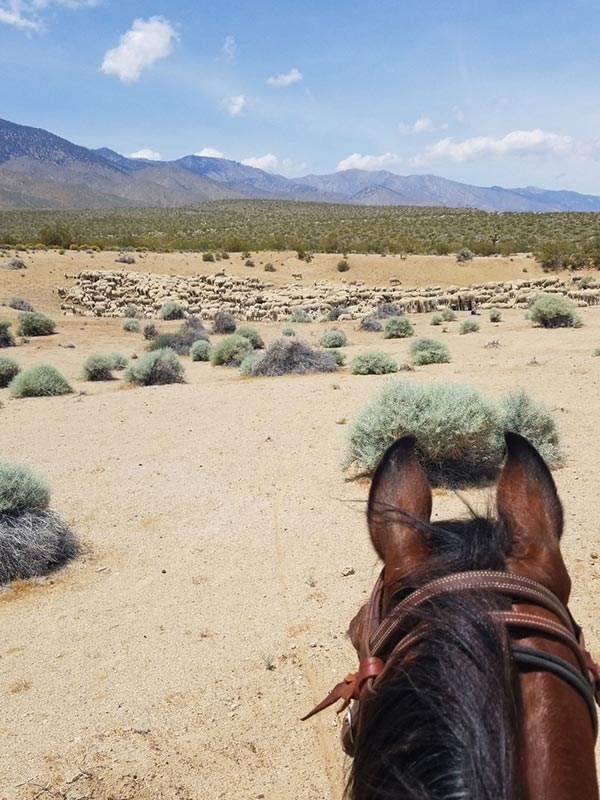
Day 12: Sharing the trail with sheep
Tuesday, May 14
17.4 miles / 5 hours, 13 minutes / 1762 ft. / 3.3 mph
Riding toward Lonepine today. Staying in Coso Junction tonight. Shorter day than normal—only 17 miles. Mike, Rebekah and their horses Cowboy, Razor, Jack and Fancy had to ride among the sheep that were on the DWP trail.
Relive the day here: http://bit.ly/190513-Day12
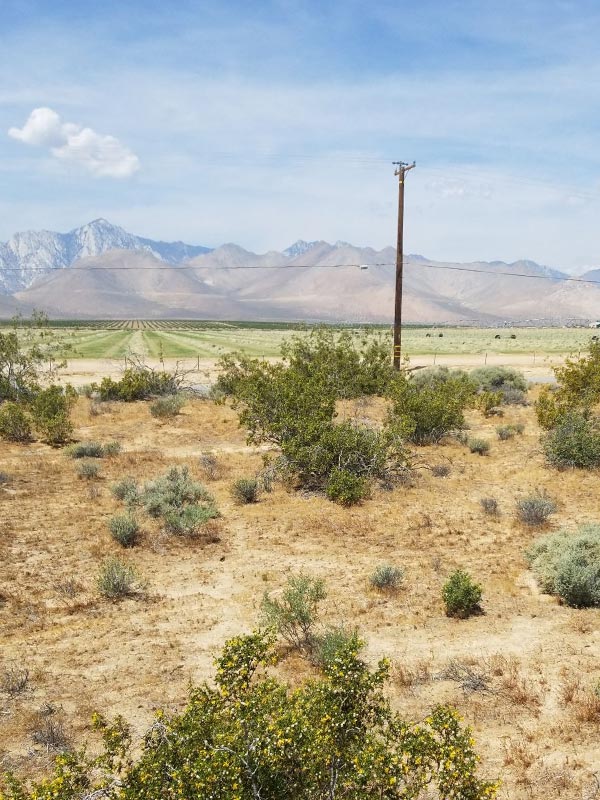
Day 11: Today was a HOT one!
Monday, May 13
16.8 miles / 4 hours, 52 minutes / 384 ft. / 3.5 mph
Extremely hot day riding through the desert. Over 90°. Had to stop several times to allow the horses to rest. Water was limited. Staged at 9-mile. Heavy wind. Dale Crawford joined the team today to provide ground support for the next several days.
Relive the day here: http://bit.ly/190513-Day11
Day 10: Time to rest… and add horses
Sunday, May 12
Day off for the horses in Inyokern, to re-up on supplies and do laundry. Sigrid arrived with a second horse for Mike. Both Mike and Rebekah are ponying a second horse so they can switch off every few days. All four horses are now on the journey.
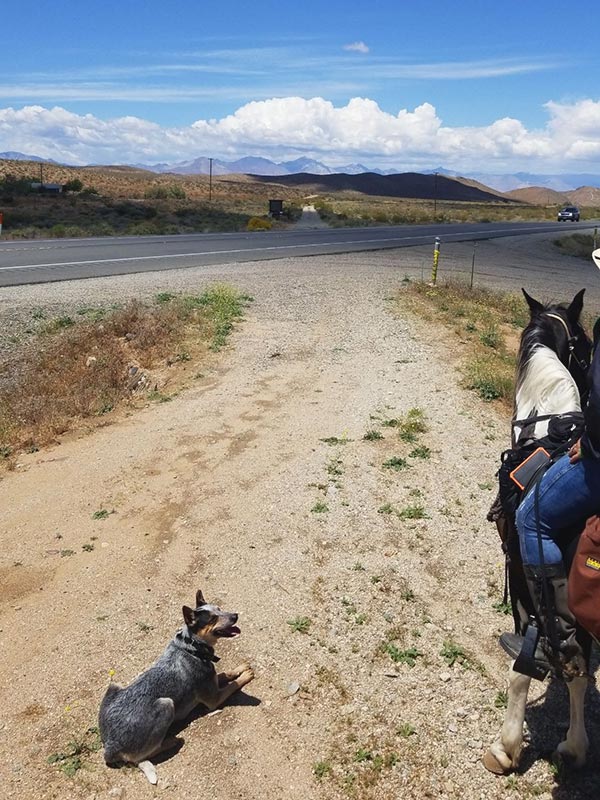
Day 9: Happy Birthday, Mike!
Saturday, May 11
24.7 miles / 6 hours, 55 minutes / 922 ft. / 3.6 mph
Long day in the saddle but it was beautiful. That evening Misha surprised Mike with a homemade birthday cake. 58 candles, no fire permit needed. Relive the day here: http://bit.ly/190511-Day9
Day 8: Rest day following a night of heavy rain
Friday, May 10
Rained like crazy last night. Everything got wet. The group decided to take today off and ride tomorrow instead. Misha, Rebekah’s daughter came out to help this morning with the trailer and moved horses to Ridgecrest for the day and overnight so they would be under cover instead of in the open desert. Today was the last day that Carol and Linda are riding with Mike and Rebekah. Tomorrow it becomes a two-person ride unless others decide to join. Pete also leaves as ground crew support and Misha and Nolan begin the chore of keeping everything in order.
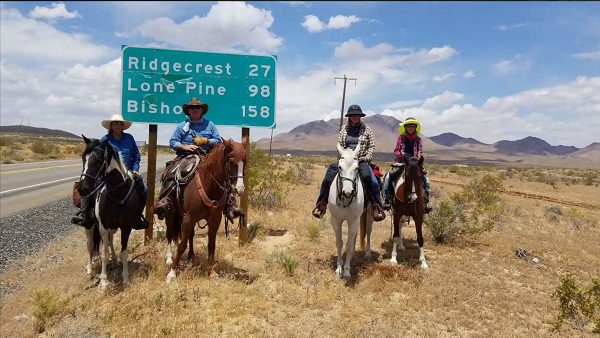
Day 7: Halfway to Bishop! Trek continues…
Thursday, May 9
25.3 miles / 6 hours, 37 minutes / 1,270 ft. / 3.8 mph
After a week’s worth of riding, the halfway point has been reached! Relive the day here: http://bit.ly/190509-Day7
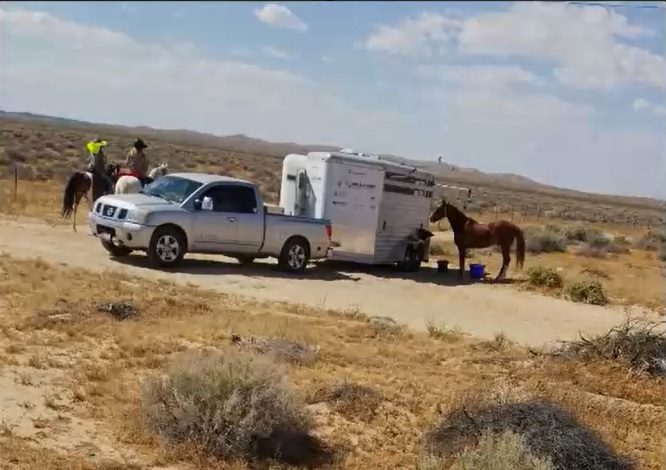
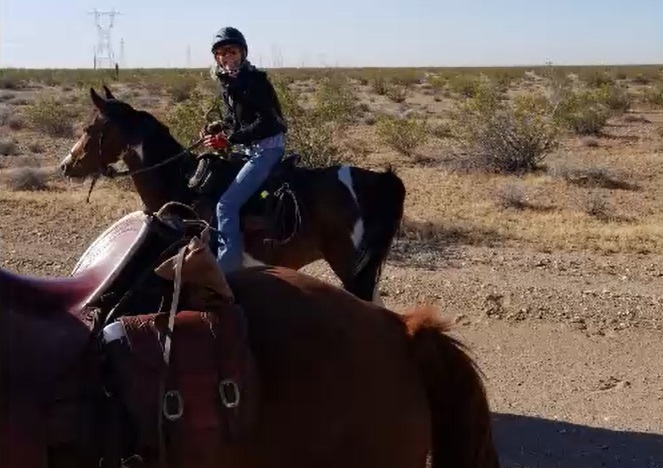
Day 6: Making progress along Highway 395
Wednesday, May 8
23.8 miles / 6 hours, 20 minutes / 692 ft. / 3.8 mph
Today, the group traveled about 300 yards off of west side of Highway 395, finishing two miles north of Kramer Junction. According to Mike, the day was uneventful. The day got warm, but they had two water stops. They crossed the 58 behind the truck stop which turned out to be pretty easy. Everything worked in their favor! Relive their day with this link: http://bit.ly/190508-Day6
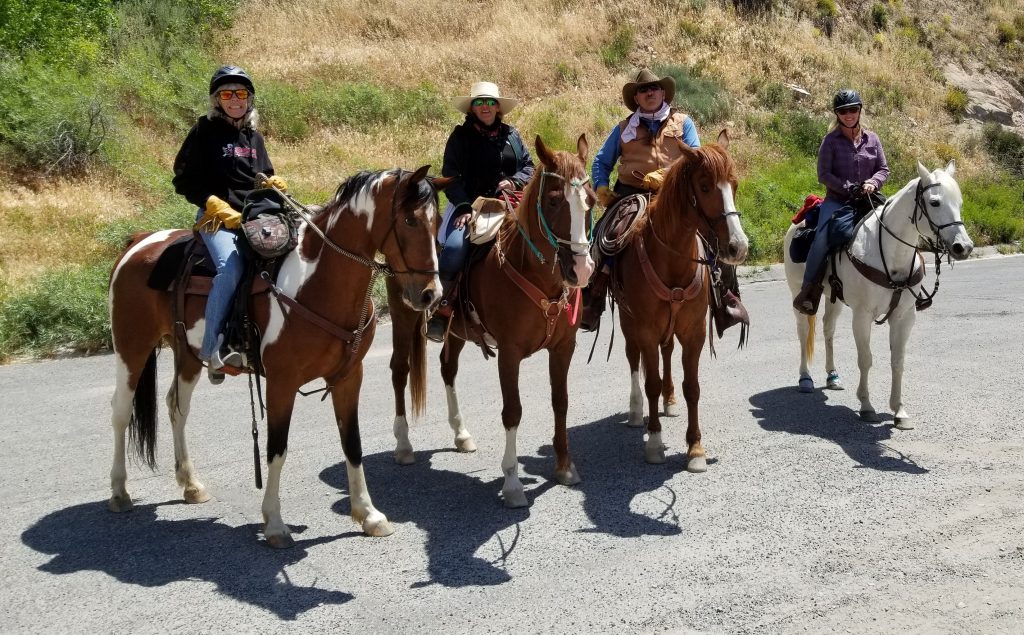
Day 5: After a windy, damp start…sunshine
Tuesday, May 7
24.8 miles / 6 hours, 31 minutes / 220 ft. / 3.8 mph
Horses and riders took a one-day break on a Day 4 layover in Phelan, and it also marked the first day of cold wind and rain. Day 5 started with Mike and the group in thick fog—everything was damp. They rode through heavy wind which made for a long ride, but eventually it warmed up. They stayed on trail until they got north of Adelanto and then cut across the desert to their overnight destination. Relive their day on the link!: http://bit.ly/190507-Day5
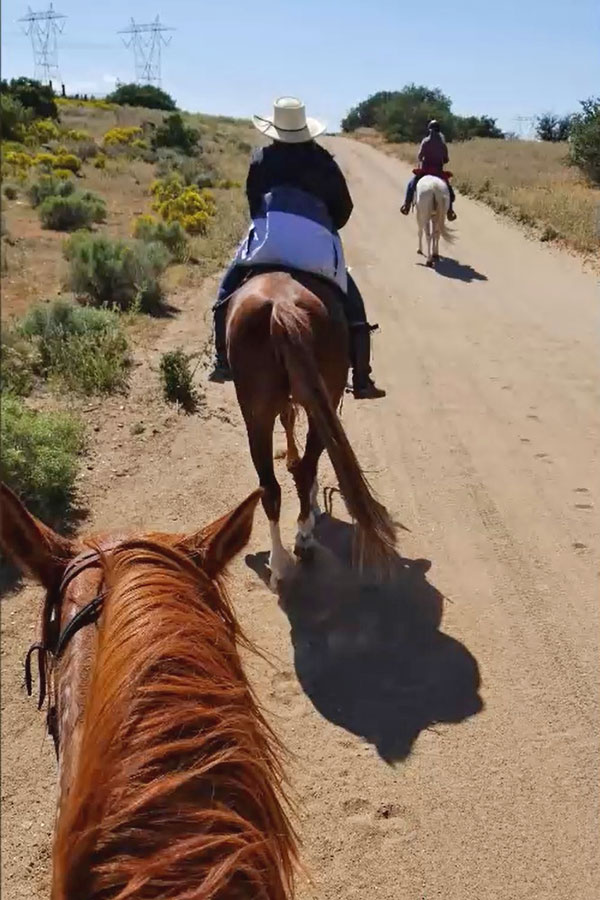
Day 3: Through the Cajon Pass
Sunday, May 5
21.8 miles / 6 hrs, 11 mins / 2,789 ft. / 3.5 mph
The group traveled along Highway 66 through Cajon Pass to Phelan. Water stop for the horses and lunch stop for the riders along the PCT at the 138. 21.8 miles / 6 hours, 11 minutes / 2,789 ft. / 3.5 mph. Follow their Day 3 route with this link!: http://bit.ly/190506-TrailRide
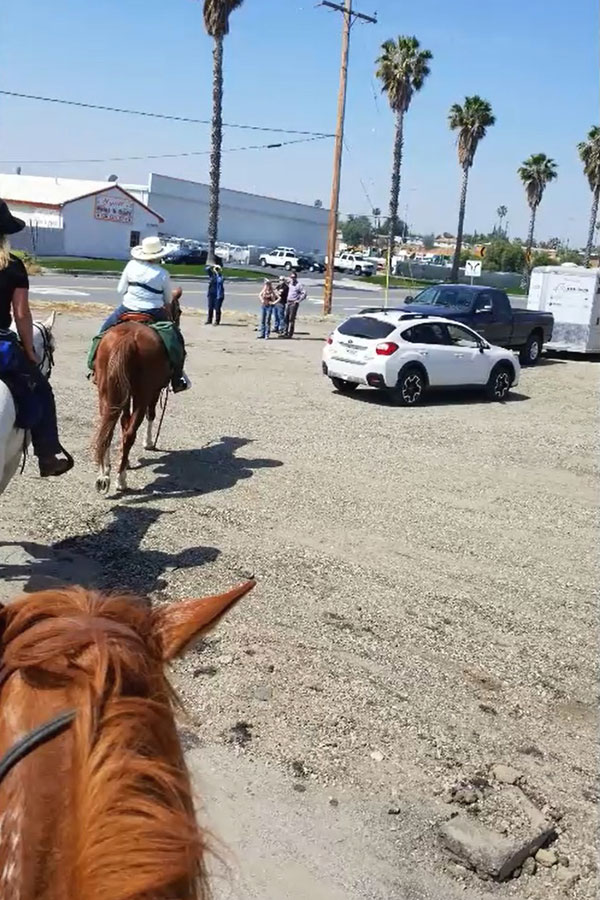
Day 2: Along the Santa Ana River basin
Saturday, May 4
18.8 miles / 5 hrs, 25 mins / 1,325 ft. / 3.5 mph
An uneventful day… after leaving Grand Terrace, they traveled through the Santa Ana River Basin and the city of Colton to reach Saturday’s final destination, Devore. Ride along with the day’s link: http://bit.ly/190504-TrailRide
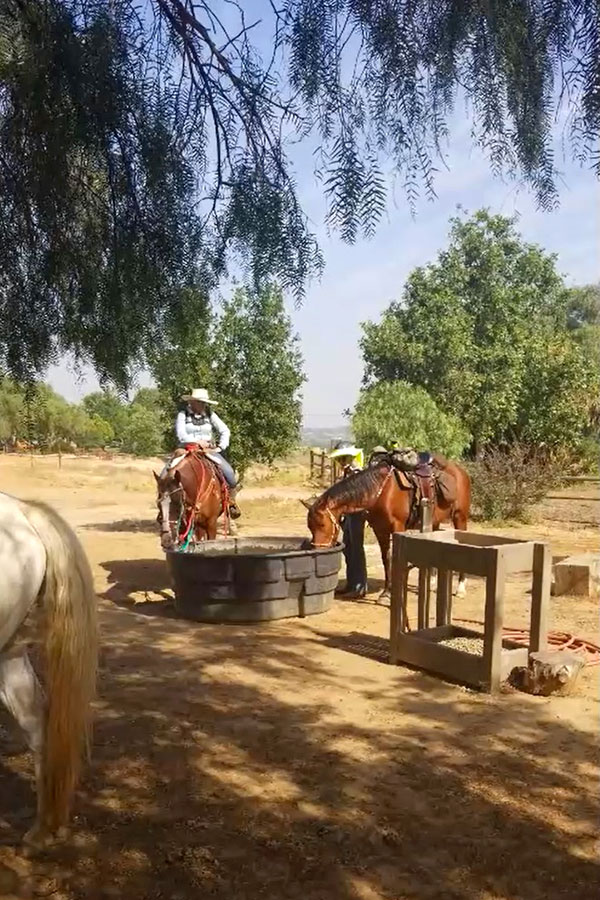
Day 1: Journey begins!
Friday, May 3
19.6 miles / 5 hrs, 18 mins / 909 ft. / 3.7 mph
Mike Williams, Rebecca Wan, Linda Wesch and Carol Kelly left Socal Equine Hospital at 8:02 a.m. on the 320-plus mile ride from Norco to Bishop. First night’s camp: Grand Terrace. Relive the first day: http://bit.ly/190503-TrailRide
Get the story! Here’s background on the riders and the ride…
If you missed the California Horsetrader’s Feb. 1 cover article on the ride, get the story by clicking here: http://bit.ly/1902-TrailRide
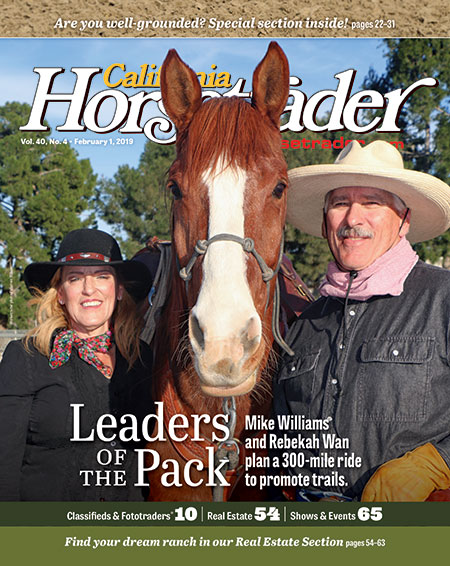
Horse Expo celebrates its 20th Anniversary
SACRAMENTO — Cal Expo came to life June 8-10 for the 20th Annual Western States Horse Expo, bringing together education, shopping, entertainment and fun for horsepeople like no one else.
One of the weekend’s highlights was the return of the Magnificent Seven All Around Stock Horse Championship. Phillip Ralls took Estelle Roitblat’s Call Me Mitch to the title, thrilling the crowd and earning $8,372.
EQUUS Film Festival comes to LAEC June 15-17
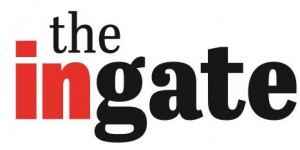 The Los Angeles Equestrian Center is honored to host the EQUUS Film Festival LA, June 15-17, 2018. The EQUUS Film Festival was created to highlight and award the diverse and creative efforts of those who artistically pay homage to the horse. The festival empowers storytellers to show the rich history and diverse tapestry of horses in human culture through equestrian content. We have feature films, documentaries, shorts, music videos, commercials, training educational materials, art and literature. As home to the storytellers of the horse world, the EQUUS Film Festival, is the first event of its kind dedicated to equestrian-themed film, fine art and authors. The annual EQUUS Film Festival Awards Event showcases the EQUUS Panels, EQUUS Pop-Up artist, filmmaker and literary gallery, FREE Saturday family films and fun fest, tours of local horse stables, a VIP Party, and the WININE Award Ceremony, are all part of the festival event program. Founded in 2013, the EQUUS Film Festival 2017 presented over 80 films and over 60 WINNIE Awards including Equestrian Art Film, Director, Documentary, Commercial, International, Music Video, People’s Choice and Best of Festival.
The Los Angeles Equestrian Center is honored to host the EQUUS Film Festival LA, June 15-17, 2018. The EQUUS Film Festival was created to highlight and award the diverse and creative efforts of those who artistically pay homage to the horse. The festival empowers storytellers to show the rich history and diverse tapestry of horses in human culture through equestrian content. We have feature films, documentaries, shorts, music videos, commercials, training educational materials, art and literature. As home to the storytellers of the horse world, the EQUUS Film Festival, is the first event of its kind dedicated to equestrian-themed film, fine art and authors. The annual EQUUS Film Festival Awards Event showcases the EQUUS Panels, EQUUS Pop-Up artist, filmmaker and literary gallery, FREE Saturday family films and fun fest, tours of local horse stables, a VIP Party, and the WININE Award Ceremony, are all part of the festival event program. Founded in 2013, the EQUUS Film Festival 2017 presented over 80 films and over 60 WINNIE Awards including Equestrian Art Film, Director, Documentary, Commercial, International, Music Video, People’s Choice and Best of Festival.
SoCal action heats up
Jimmy Flores, Sr. Spectacular draws tough competition
TEMECULA — Nicolas Barthelemy relocated his training barn early this year to Moorpark, but once place you can still find the talented trainer is atop the standings at the end of the day.
Barthelemy was one of the stars of the 2018 Southern California Reined Cow Horse Association’s Jimmy Flores, Sr. Spectacular, held May 18-20 at Casner’s Ranch.
Barthelemy, riding Manuel Rojo’s WRS Shiney Diamond (WR This Cats Smart x Shiney Miss Hickory), outscored the field in the $1,000-added Open Hackamore Spectacular. In another prestigious aged-event class at the Jimmy Flores, Sr. Memorial, the $1,000-added Open Bridle Spectacular, Barthelemy rode Joel Jewett’s Im Smooth N Smart (Smooth As A Cat x Vandalena) to the reserve title behind Jason Grimshaw on Lauren Boychuk’s Mister OMG (One Time Pepto x Sallie B Badge). Barthelemy and Im Smooth N Smart also won the Open Bridle class.


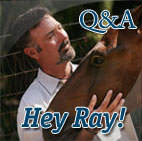
 Read Columns
Read Columns
